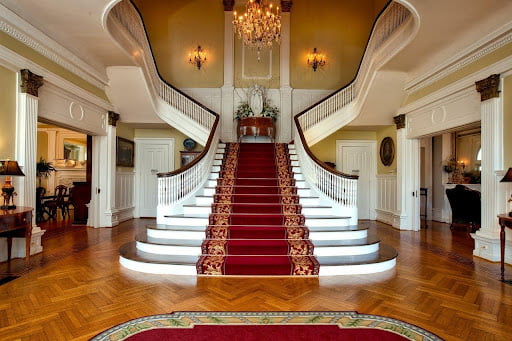Introduction:
Dubai, a city synonymous with luxury and opulence, continually pushes the boundaries of architectural and design excellence. Its hospitality industry, in particular, stands as a testament to this relentless pursuit of perfection. As the city evolves, so too does its hotel landscape, with renovations and interior design innovations playing a pivotal role in redefining luxury. This blog explores the latest trends and cutting-edge developments in hotel renovation Dubai and interior design in Dubai, showcasing how the city remains at the forefront of global hospitality.
1. Embracing Technological Integration
One of the most significant innovations in hotel renovation and interior design services Dubai is the seamless integration of technology. Modern travelers expect a high level of convenience and connectivity, and hotels in Dubai are meeting this demand with smart rooms equipped with the latest technology.
Smart Rooms and IoT:
Hotels are incorporating Internet of Things (IoT) devices to create smart rooms where guests can control lighting, temperature, and entertainment systems via a single interface, often through a mobile app or in-room tablet. This technological integration extends to smart mirrors, automated window treatments, and even voice-activated assistants like Alexa or Google Assistant, enhancing the guest experience through personalized, intuitive interactions.
Advanced Security Systems:
Security remains a top priority, and innovative hotels are implementing advanced security systems, including biometric access, facial recognition, and sophisticated surveillance technologies. These advancements not only ensure guest safety but also streamline check-in and check-out processes, adding an extra layer of convenience.
2. Sustainable and Eco-Friendly Design
As sustainability becomes a global imperative, Dubai’s luxury hotels are adopting eco-friendly practices in their renovation and design processes. This commitment to sustainability is reshaping the concept of luxury, where environmental consciousness and opulence coexist harmoniously.
Green Building Practices:
Many hotels are now pursuing LEED certification and other green building standards, integrating energy-efficient systems, solar panels, and sustainable construction materials. Water conservation measures, such as low-flow fixtures and greywater recycling systems, are becoming standard, significantly reducing the environmental footprint.
Biophilic Design:
Biophilic design, which emphasizes the incorporation of natural elements into the built environment, is gaining traction in Dubai’s hotel industry. This approach includes the use of natural light, indoor greenery, and natural materials like wood and stone. Such design not only enhances aesthetic appeal but also promotes well-being by creating a calming, rejuvenating atmosphere for guests.

3. Culturally Inspired Interiors
Dubai’s rich cultural heritage and diverse influences are increasingly reflected in hotel interior designs. This trend involves a careful blend of traditional and contemporary elements, creating spaces that are both luxurious and deeply connected to the local culture.
Art and Artifacts:
Hotels are curating art collections and incorporating artifacts that celebrate the region’s history and culture. From traditional Arabic calligraphy and motifs to contemporary art pieces by local artists, these elements add a unique, authentic touch to the hotel’s ambiance.
Architectural Elements:
Traditional architectural elements such as mashrabiya (intricate wooden screens), arched doorways, and ornate tile work are being reinterpreted in modern designs. These features not only pay homage to the region’s architectural heritage but also provide a distinctive sense of place, enhancing the overall guest experience.
4. Wellness-Oriented Spaces
The global wellness trend has made a significant impact on hotel design in Dubai, with a growing emphasis on creating spaces that promote health and well-being.
Spa and Wellness Centers:
Luxury hotels are investing heavily in state-of-the-art spa and wellness centers, offering a range of holistic treatments and experiences. These spaces are designed with tranquility and relaxation in mind, featuring elements such as natural light, calming water features, and soothing color palettes.
Fitness and Recreational Facilities:
In addition to traditional gym facilities, hotels are introducing innovative fitness and recreational options, such as rooftop yoga studios, meditation rooms, and immersive virtual fitness experiences. These amenities cater to the modern traveler’s desire for a balanced lifestyle, even while on the road.
5. Personalized Guest Experiences
The concept of personalization is revolutionizing the hospitality industry, and Dubai’s luxury hotels are at the forefront of this trend. By leveraging data and technology, hotels are offering tailored experiences that cater to the unique preferences and needs of each guest.
Customized Interiors:
Some hotels are offering customizable room interiors, allowing guests to choose from various themes or configurations to suit their tastes. This level of personalization extends to in-room amenities, dining options, and even the type of pillow or mattress firmness.

Exclusive Services:
Personalized services such as private butlers, bespoke dining experiences, and curated excursions are becoming standard in luxury hotels. These services are designed to anticipate and exceed guest expectations, providing an unparalleled level of comfort and convenience.
6. Open and Flexible Spaces
Modern travelers value flexibility and openness in design, and Dubai’s hotels are responding with spaces that are adaptable and multifunctional.
Lobby Redesign:
Traditional hotel lobbies are being transformed into vibrant, multifunctional spaces that serve as social hubs, workspaces, and relaxation areas. These redesigns often feature open-plan layouts, comfortable seating, and integrated technology, encouraging guests to linger and interact.
Flexible Room Configurations:
Hotels are also rethinking room layouts to offer greater flexibility. Movable walls, modular furniture, and adaptable lighting solutions allow guests to customize their space according to their needs, whether they’re working, relaxing, or entertaining.
Conclusion
Dubai’s hotel industry continues to set new benchmarks in luxury, driven by innovations in renovation and interior design. By embracing technology, sustainability, cultural authenticity, wellness, personalization, and flexible spaces, Dubai’s hotels are not just meeting the evolving needs of modern travelers but exceeding them.
As the city looks to the future, these trends will undoubtedly shape the next generation of hospitality experiences, solidifying Dubai’s reputation as a global leader in luxury and innovation. For hotel owners and developers, staying abreast of these developments is crucial to maintaining competitiveness and ensuring that their properties remain at the cutting edge of the industry. For guests, it means enjoying an ever-evolving landscape of opulent, unique, and unforgettable experiences that truly redefine luxury.








